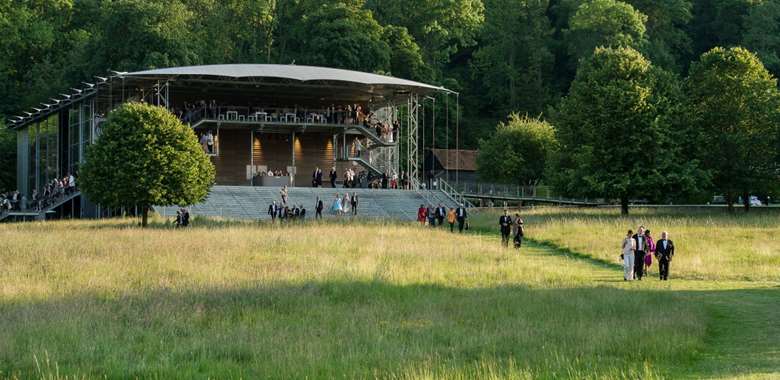'If we want people of all backgrounds to engage with opera, it needs to happen in places fully accessible by public transport' | Prompter – Andrew Mellor
Andrew Mellor
Wednesday, August 23, 2023
Life beyond the country house – one summer weekend in the broadsheets crystallises the stark crossroads facing British opera

Clive Barda / Garsington
Two newspaper articles from the weekend lingered heavy in my mind on the Monday morning I sat down to write this month’s column. In a canny piece of reporting for The Times, Richard Morrison had looked into the existential threat facing Welsh National Opera following the reduction by 35 per cent of its grant from Arts Council England.
Morrison had managed to glean that ACE has offered WNO ‘transition money’ (a cash parachute which will land you on the same treacherous financial ground but make the experience seem a little less painful) on the proviso that it axe a quarter of its orchestra and a third of its chorus. A raft of opera stars including Kiri Te Kanawa had subsequently signed an open letter to The Times claiming ACE was effectively engineering the demise of the 77-year-old company. Plenty see ACE up to the same tricks with ENO.
The difference, according to Morrison, is that nobody at WNO is daring to argue the ultimatum. Clearly, this is a company in fear of its life. We’re already seeing the curtailing of WNO’s touring activities in England, beginning with the cessation of full-scale professional opera in Liverpool. Will we eventually see WNO cease to exist in its current form?
A day later, Simon Heffer wrote a puppyish piece in The Daily Telegraph under the headline ‘British opera is in deep crisis – but one company promises a way out’ (sure, he probably didn’t write the headline). But the premise was a hymn of praise to Garsington Opera in Oxfordshire with the suggestion that the company had found a winning formula of productions ‘straightforward without being predictable’ that employed ‘the highest quality of musicians’.
Agreed: you have to take your hat off to Garsington, which has produced a string of absorbing productions having come to maturity at lightning speed. For some years,
Garsington has looked unique among the new breed of country house opera festivals for having seized the initiative by going back to basics. But the truth is, Welsh National Opera has been putting on pretty good shows all year round over the same period of time. Even Garsington’s bosses would surely agree that if their company shows ‘a way out of the crisis’ then we all have a problem, given that it only stages opera for six weeks a year. Is that a business model ACE has in mind for WNO?
Heffer had some good points on internal decision-making: on singers trained in studios, on the matching of the right director to the right work – these strategic objectives that Garsington has prioritised and delivered on. What wasn’t so clear is how the Garsington model delivers on those industry watchwords of accessibility and openness. Expensive, dress-coded (effectively) and situated a long way from comprehensive public transport links, Garsington, in fact, doesn’t deliver on them at all. Fair enough: that’s not Garsington’s business model and the company is not Arts Council funded.
Yet again, Arts Council England is proving that it alone cannot be allowed to determine the future of opera in England
If UK opera’s centre of gravity moves away from civic, touring opera like that provided by WNO (and the Glyndebourne Tour), the openness and accessibility we’ve been striving for will be seriously eroded. Where does the country house opera model leave those noncar-owning, city-dwelling, middle-income earners who see opera as a year-round source of sustenance and enlightenment rather than a fixture in the social calendar? Of course, those country house opera festivals could adopt the Glyndebourne model of balancing the champagne and tuxedos of the summer season with a winter tour to faraway English cities aided by an Arts Council grant. That looks like an excellent meet-halfway idea to everyone…except Arts Council England, which decided to cut the grant.
You can’t blame enterprising opera companies like Garsington for setting out to deliver excellent work without a public subsidy. But they would probably admit themselves that they initially saw themselves as part of a broader operatic ecosystem which, among other things, helps keep the freelancers they employ in paid work for the other 46 weeks a year.
If we want people of all backgrounds and circumstances to engage with opera – and end up taking it seriously enough to want to traipse out to the countryside to watch it for those few weeks it’s not available in the city – opera needs to happen in places fully accessible by public transport, with subsidised ticket prices in civic theatres with no dress guidance broadly frequented for pantomime and comedy. So, much like opera was in the wider UK before ACE’s wrecking ball hit WNO and the Glyndebourne Tour.
At the risk of repeating myself, I was introduced to opera by WNO and Glyndebourne because they visited my hometown, Plymouth, with an array of world-class artists and productions. Between them, they brought nine operas a season to the city. At the last count, that number stood at just one – WNO’s The Magic Flute. Frankly, I find it utterly heartbreaking.
Yes, the country house opera boom has enriched England’s operatic landscape considerably. But it suits the opera-phobic Arts Council England – and perhaps the Simon Heffers of this world, who one way or another enjoy privileged access to in-demand performances – for these new, private companies to become the backbone of the country’s opera scene. That, without the season-round, civic offerings of the likes of WNO, the Glyndebourne Tour (and yes, ENO), will be catastrophic in the long term. Yet again, Arts Council England is proving that it alone cannot be allowed to determine the future of opera in England. @operalastnight









